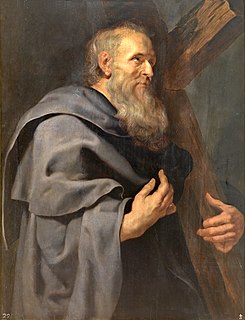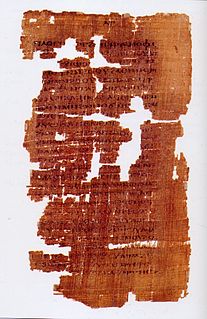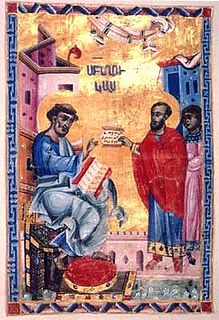
Apocrypha are works, usually written, of unknown authorship or of doubtful origin. Biblical apocrypha is a set of texts included in the Latin Vulgate and Septuagint but not in the Hebrew Bible. While Catholic tradition considers some of these texts to be deuterocanonical, Protestants consider them apocryphal. Thus, Protestant bibles do not include the books within the Old Testament but have often included them in a separate section, usually called the Apocrypha. Other non-canonical apocryphal texts are generally called pseudepigrapha, a term that means "false attribution".

Philip the Apostle was one of the Twelve Apostles of Jesus. Later Christian traditions describe Philip as the apostle who preached in Greece, Syria, and Phrygia.

Ubuntu is a free and open-source Linux distribution based on Debian. Ubuntu is officially released in three editions: Desktop, Server, and Core. Ubuntu is a popular operating system for cloud computing, with support for OpenStack.

The New Testament apocrypha are a number of writings by early Christians that give accounts of Jesus and his teachings, the nature of God, or the teachings of his apostles and of their lives. Some of these writings have been cited as scripture by early Christians, but since the fifth century a widespread consensus has emerged limiting the New Testament to the 27 books of the modern canon. Roman Catholic, Eastern Orthodox and Protestant churches generally do not view these New Testament apocrypha as part of the Bible.

Canonical Ltd. is a UK-based privately held computer software company founded and funded by South African entrepreneur Mark Shuttleworth to market commercial support and related services for Ubuntu and related projects. Canonical employs staff in more than 30 countries and maintains offices in London, Austin, Boston, Shanghai, Beijing, Taipei, and the Isle of Man.

The Third Epistle to the Corinthians is a pseudepigraphical text under the name of Paul the Apostle. It is also found in the Acts of Paul, and was framed as Paul's response to the Epistle of the Corinthians to Paul. The earliest extant copy is Papyrus Bodmer X, dating to the third century. Originally written in Greek, the letter survives in Greek, Coptic, Latin, and Armenian manuscripts.

The Acts of Barnabas is a non-canonical pseudepigraphical Christian work that claims to identify its author as John Mark, the companion of Paul the Apostle, as if writing an account of Barnabas, the Cypriot Jew who was a member of the earliest church at Jerusalem; through the services of Barnabas, the convert Saul was welcomed into the apostolic community. Three pseudepigraphical works are linked with the name of Barnabas: the Epistle of Barnabas, written between AD 70 and 135, this Acts and the medieval text Gospel of Barnabas.

The Apocryphon of James, also known by the translation of its title – the Secret Book of James, is a pseudonymous text amongst the New Testament apocrypha. It describes the secret teachings of Jesus to Peter and James, given after the Resurrection but before the Ascension.

The Acts of Peter and the Twelve is one of the texts from the New Testament apocrypha which was found in the Nag Hammadi library.
The non-canonical books referenced in the Bible includes pseudepigrapha, writings from Hellenistic and other non-Biblical cultures, and lost works of known or unknown status. By the "Bible" is meant those books recognised by most Christians and Jews as being part of Old Testament as well as those recognised by Christians alone as being part of the Biblical apocrypha or of the Deuterocanon.
Demas or Demos is a man mentioned by the Apostle Paul in the New Testament of the Bible, and appears to have been involved for a time in his ministry.

The Acts of the Apostles is a genre of Early Christian literature, recounting the lives and works of the apostles of Jesus. The Acts are important for many reasons, one of them being the concept of apostolic succession. They also provide insight into the valuation of "missionary activities among the exotic races," since some of them feature missionary work done among, for instance, the Cynocephaly.

MNT is a Max-binding protein that is encoded by the MNT gene
The 1983 Code of Canon Law, also called the Johanno-Pauline Code, is the "fundamental body of ecclesiastical laws for the Latin Church". It is the second and current comprehensive codification of canonical legislation for the Latin Church sui iuris of the Catholic Church. It was promulgated on 25 January 1983 by John Paul II and took legal effect on the First Sunday of Advent 1983. It replaced the 1917 Code of Canon Law, promulgated by Benedict XV on 27 May 1917.

Dishevelled (Dsh) is a family of proteins involved in canonical and non-canonical Wnt signalling pathways. Dsh is a cytoplasmic phosphoprotein that acts directly downstream of frizzled receptors. It takes its name from its initial discovery in flies, where a mutation in the dishevelled gene was observed to cause improper orientation of body and wing hairs. There are vertebrae homologs in zebrafish, Xenopus (Xdsh), mice and humans. Dsh relays complex Wnt signals in tissues and cells, in normal and abnormal contexts. It is thought to interact with the novel protein, SPATS1, when regulating the Wnt Signalling pathway.

In mathematics, a rational number is any number that can be expressed as the quotient or fraction p/q of two integers, a numerator p and a non-zero denominator q. Since q may be equal to 1, every integer is a rational number. The set of all rational numbers, often referred to as "the rationals", the field of rationals or the field of rational numbers is usually denoted by a boldface Q ; it was thus denoted in 1895 by Giuseppe Peano after quoziente, Italian for "quotient".

A biblical canon or canon of scripture is a set of texts which a particular religious community regards as authoritative scripture. The English word "canon" comes from the Greek κανών, meaning "rule" or "measuring stick". Christians became the first to use the term in reference to scripture, but Eugene Ulrich regards the idea as Jewish.

The canon of the New Testament is the set of books Christians regard as divinely inspired and constituting the New Testament of the Christian Bible. For most, it is an agreed-upon list of twenty-seven books that includes the Canonical Gospels, Acts, letters of the Apostles, and Revelation. The books of the canon of the New Testament were written before 120 AD.








